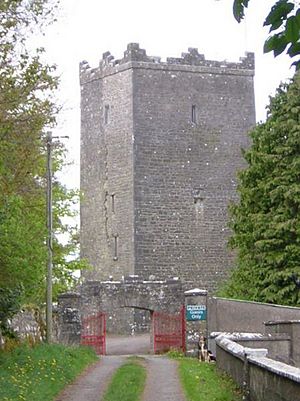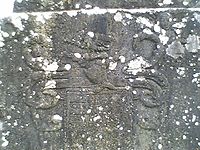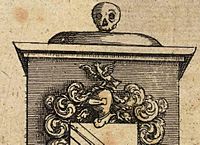William Nugent facts for kids
William Nugent (Irish: Uilliam Nuinseann) (1550–1625) was an important figure in 16th-century Ireland. He was part of the Hiberno-Norman (Irish-Norman) community. William was the younger brother of Christopher, the fourteenth Baron of Delvin. He inherited the castle and lands of Ross in County Meath from his father, Richard Nugent. His mother was Elizabeth Preston. She was the daughter of the 3rd Viscount Gormanston.
Contents
William Nugent's Life and Challenges
William Nugent first became known in 1573. He married Jane Marward, an heiress, without proper permission. She was under the care of his uncle, Nicholas Nugent. In 1575, William was briefly held. People thought he was involved when his brother, Lord Delvin, refused to support a declaration against the Earl of Desmond.
In 1577, William and his wife were given control of Jane's father's lands. These lands were worth a lot of money each year. William was suspected of supporting a rebellion. This rebellion was led by Viscount Baltinglass. But William managed to escape capture. He hid with Toirdhealbhach Luinneach Ó Néill, who refused to hand him over.
William was specifically not included in a general offer of forgiveness. Because of Lord Grey's strict actions, William was forced to start his own fight. With help from the Ó Conchúir and Kavanagh families, he caused trouble near the English-controlled area called the Pale.
Escape and Exile
This uprising was strong but did not last long. William spent much of the winter without shelter. His friends were afraid to talk to him. William's wife, showing great love, managed to send him some shirts. She was caught and put in prison for a year.
Finally, in January 1582, William escaped to Scotland. From there, he traveled through France to Rome. Soon after, his uncle Nicholas, who had lost his job as a judge, faced serious charges. He was found guilty and executed.
In Rome, William was not welcomed at first. But when a plan for Spain to invade England became more serious, he was often asked for advice. He met with important church leaders about the chances of a big uprising in Ireland.
Return to Ireland
Around Easter 1584, William was told to go to Paris. There, he met with Archbishop Beaton and the Duke of Guise. They sent him with secret letters to James VI of Scotland. Later that summer, he returned to Ulster, dressed as a friar.
In September, news reached Perrot that William was being hidden by Maguire and O'Rourke. However, he had not found much other support. Perrot hoped to capture him soon. But by November, he still had not succeeded. So, Perrot offered William a pardon. William accepted the offer and formally gave up his fight in December.
Meanwhile, his wife had gotten her lands back. This happened because the Earl of Ormonde spoke up for her. William slowly got back his old position and influence.
Later Life and Legal Battles
William never forgave Sir Robert Dillon for how strongly he pursued William's family. In 1591, William formally accused Dillon of unfair actions as a judge. William's case was strong. Many people thought there was good evidence that Dillon was guilty.
However, officials decided that it was not wise to punish a judge too harshly. This was especially true if the accusations came from someone the judge had acted against for the Queen. So, even though commissioners were appointed to hear the charges, many obstacles came up. In November 1593, Dillon was found innocent of all accusations.
The rest of William Nugent's life was peaceful. In 1606, King James I agreed to restore his family's rights and property. A bill for this was sent in 1613. But it was not approved by the Irish Parliament. William Nugent passed away on June 30, 1625.
He and his wife, Janet Marward, had three sons. Robert died in 1616. Christopher died unmarried. James became a military leader. His rebellion later caused the family's estate to be lost.
Was William Nugent the Real Shakespeare?
In 1978, a writer named Elizabeth Hickey wrote a book called The Green Cockatrice. In her book, she suggested that William Nugent might have been the real author of Shakespeare's famous plays and poems.
Hickey believed that William Nugent's life experiences gave him special knowledge. These experiences included political plots, religious conflicts, military events, legal matters, and international diplomacy. These are all themes often found in Shakespeare's works.
For example, William Nugent was imprisoned for opposing taxes in Ireland. He rebelled in 1581 and had to flee into exile. He traveled to Scotland, France, and Italy. These places are often featured in Shakespeare's plays. During his exile, he met many important European leaders. This included the Pope and the kings of Spain, France, and Scotland. He was even involved in plans for an invasion of England.
Brian Nugent, who wrote Shakespeare was Irish!, also supports this idea. He points out William Nugent's court case in the 1590s. In this case, William accused a senior Irish judge and the Lord Deputy of corruption. Brian Nugent believes this shows the deep legal knowledge seen in Shakespeare's plays. Historians John Sherren Brewer and William Bullen also mention this court case.
William Nugent was also a strong supporter of the Catholic faith. His family was one of the most important Catholic families in Ireland during Shakespeare's time. He even started a debate in Dublin to support Catholicism. This fits with newer ideas about Shakespeare's religion.
 | Dorothy Vaughan |
 | Charles Henry Turner |
 | Hildrus Poindexter |
 | Henry Cecil McBay |




